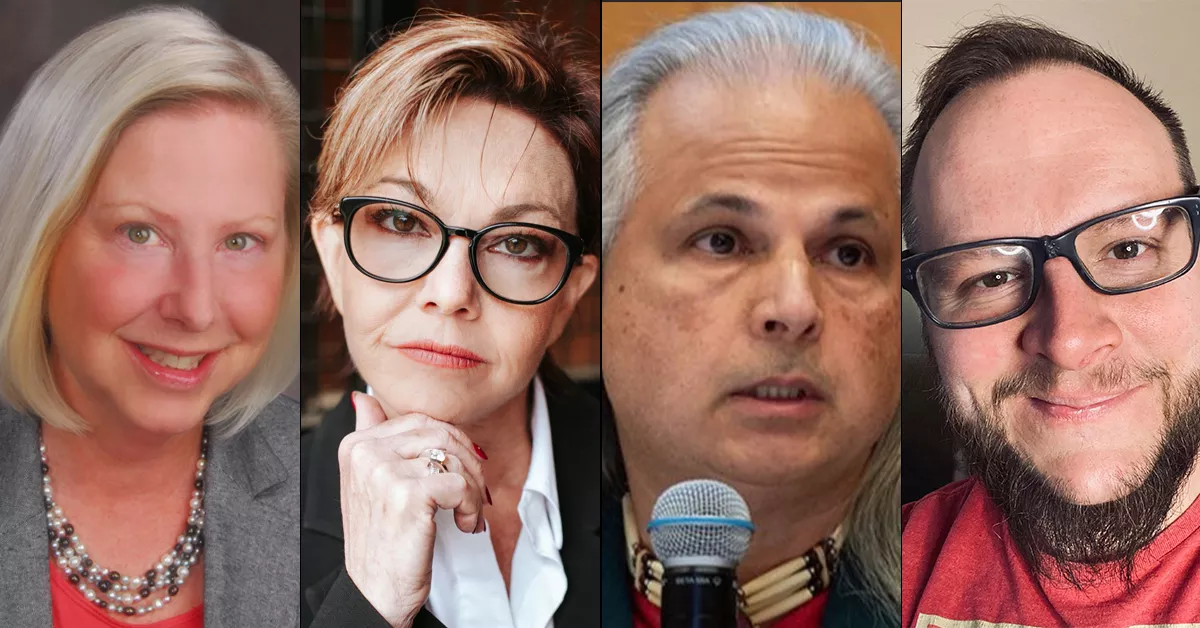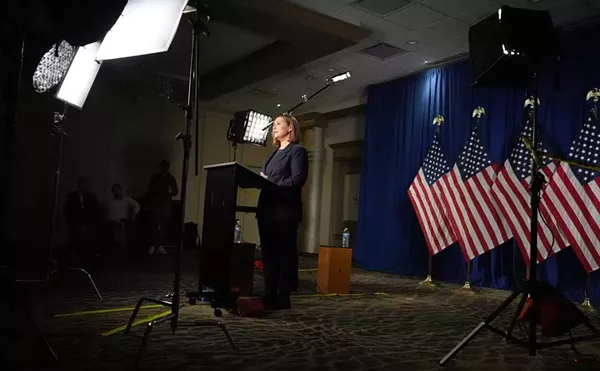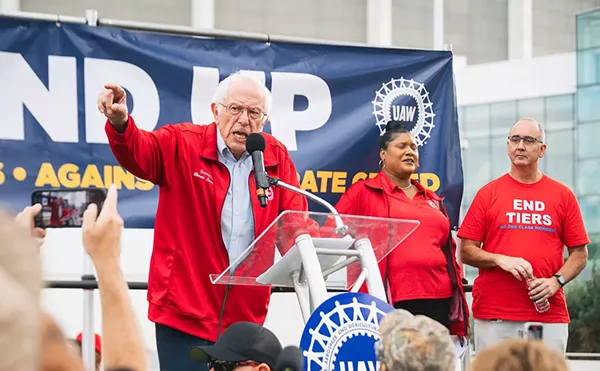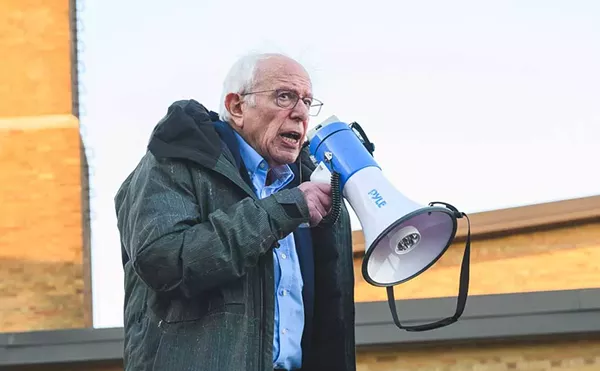
Earlier this month, history was made in Michigan when Democrat Gov. Gretchen Whitmer debated her Republican challenger Tudor Dixon ahead of the Tuesday, Nov. 8 general election. For the first time, the two major-party candidates are both women. But they’re not the only women — or men — running for the office. There are candidates representing four other parties on the ballot, though you probably haven’t heard much of them, if at all.
Grand Rapids’s WOOD-TV, which aired the first of the two debates, tells Metro Times that the other candidates were not invited because of the guidelines of its parent company Nextstar, which requires candidates to have at least 10% support in a poll. Detroit’s WXYZ-TV, which aired the second debate, says candidates have to poll at 5% at least. Michigan’s third-party candidates have drawn less than 4% combined.
It’s a vicious cycle. With little campaign cash on hand and little media attention, it’s unlikely that a third party candidate can crack that ceiling — even though with growing partisan polarization, it feels like the U.S. political duopoly is untenable. Perhaps unsurprisingly, a Pew Research Center poll released earlier this year found that nearly half of young voters said they wished there were more than two parties to choose from.
Since you won’t see these candidates on TV, Metro Times reached out to them to let them make their case.
Mary Buzuma: Libertarian Party
Of Michigan’s other political parties, the Libertarian Party is the most popular, though still a distant third. Thanks to Gary Johnson’s 2016 presidential campaign (or perhaps more to the unpopularity of both Donald Trump and Hillary Clinton), the party cracked 5% of the vote here, allowing it to hold its first gubernatorial primary in 2018. Michigan Libertarians received further attention in 2020 when former U.S. Rep. Justin Amash of Grand Rapids switched his affiliation from Republican to Libertarian and briefly flirted with running for president. There are whispers he could run again in 2024.
“We were finally moved from the kiddie table at Thanksgiving, and we were sitting with the grownups,” says Michigan Libertarian gubernatorial candidate Mary Buzuma. “That was huge.”
A retired Navy veteran who lives in Grand Haven, Buzuma has run for office as a Libertarian five times, including for governor, U.S. Representative, state Representative, state Senate, and county clerk. She says she was approached by the state party. “This will be my last time,” she says. “Ten years of rejection is enough. But there has to be more voices in government.” She selected her own running mate, Brian Ellison of Royal Oak, who also served in the military.
Buzuma believes the two parties have become too big, yet are primarily concerned with the short-term goal of winning elections. A former supporter of Democrats, she says she became disillusioned with them because they claim to be the party of peace yet also support foreign wars, and first became interested in libertarianism about 17 years ago when she heard Ron Paul speaking on the radio.
Buzuma says one of Michigan’s biggest problems is education, and rejects the notion that the solution is simply providing more funding. “Throwing more money at a problem doesn’t always improve it,” she says. “But competition does.”
Buzuma advocates for schools choice programs, as well as the Student Opportunity Scholarship Program Initiative, a proposal supported by Trump’s former education secretary Betsy DeVos that would disburse scholarships from private donors. “I really think that this would give parents and students an opportunity to at least leave a school that is not working for them,” Buzuma says. (Opponents have accused the proposal of “privatizing education.”)
Buzuma is critical of the school closures during the COVID-19 pandemic, as well as Whitmer’s use of executive orders under the Emergency Powers of Governor Act, which she extended without the support of the legislature until the Michigan Supreme Court struck the law down. “She wanted to win the war on COVID, but nobody knew what winning was,” Buzuma says, adding that she would call for additional legislation that would put guard rails on emergency powers.
“Some are very troubling to me because they put an unprecedented amount of power into the hands of bureaucrats who are not elected, like the Department of Health and Human Services,” Buzuma says, adding that’s what happened when Whitmer declared a public health emergency due to the rise of teen vaping. Michigan then became the first state to ban flavored e-cigarettes, which are also used by adults as an alternative to more harmful traditional cigarettes, and the ban was dropped after vape shops filed a lawsuit.
Buzuma thinks health measures like wearing masks or getting vaccinated should be choices left to individuals, though she says she got vaccinated against COVID-19 because she was serving as the primary caregiver for her mother. “For me, I understand that there are soft constraints on my liberty, one being family obligation,” she says. “If it was just me by myself, I probably wouldn’t have.”
On Proposal 3 — or ensrhining the right to abortion in Michigan law, one of the biggest issues on the November ballot — Buzuma says she personally believes that it is wrong, but says the government should have no say in the matter.
Buzuma supports cannabis legalization, and says more drugs should be decriminalized, which she believes would curb problems with fentanyl and opioids, as well as decrease crime. She thinks police brutality would also be decreased if departments focused their resources more on criminals than minor traffic offenders.
Of Line 5, the controversial oil and gas pipeline in the Great Lakes that Whitmer has unsuccessfully called to be shut down, Buzuma says she supports Canadian operator Enbridge’s proposal to relocate it into an underground tunnel. “I would hate to see an oil spill in that area,” she adds. She also says she’s skeptical of alternative energy sources like wind and solar. “We’re finding out that wind is not that efficient and solar takes a lot of space,” she says. “To me, a mix for now is probably the best option.”
She is also against corporate welfare and calls for tax cuts. “Michigan taxpayers work hard for their money,” she says. “What I would like to do is just give people more money through a well-deserved tax cut … because people, consumers, grow an economy. Government doesn’t. Government just takes from it. They only grow more government, or more government jobs.”
More information about her campaign is available at electmarybuzuma.com.
Donna Brandenburg: U.S. Taxpayer Party
Another woman running for governor is Donna Brandenburg, a Grand Rapids-area businesswoman who initially ran as a Republican. Her campaign was derailed along with a handful of other GOP hopefuls after the company they hired to collect signatures to get on the primary ballot was accused of submitting forged signatures. Brandenburg faced another hurdle when her running mate Melissa Carone — a Trump supporter and conspiracy theorist who was parodied on Saturday Night Live — dropped out to support Dixon instead.
Brandenburg is also prone to conspiracy theories. She believes that the signatures issue was a “farce” to illegally keep her off the ballot, and that Carone was coerced by “threats” to support Dixon. Since the ballots are already printed, she has not selected an alternate running mate, but says if elected she would choose “a very strong Lt. Governor who is able to stand up to some of the pressures, regardless of what comes at them.”
Brandenburg says she had never run for office before. “I believe that all politicians are liars, cheats, and thieves, and I didn’t want anything to do with it,” she says, but the U.S. Taxpayers Party of Michigan approached her to run. The party is the local affiliate of the national Constitution Party, which promotes a conservative Christian view of the U.S. Constitution. Brandenburg says her faith led her to decide to run. “I’m an unapologetic Christian,” she says. “I said to God, ‘If you want me to run, I’m willing, but you’re going to have to make this thing happen.’”
Brandenburg believes Whitmer overreacted to the COVID-19 pandemic, which she says was a boon to big corporations, including pharmaceutical companies. “Every single action they took was for self-enrichment, and had nothing to do with the protection of our people,” she says. “They ruined small businesses in this state. They attacked the wealth of our families, our individual rights.”
She declined to answer whether she is vaccinated against COVID-19. “It’s my personal information and I’m not going to answer that,” she says.
Due to her religious beliefs, she does not support abortion, and she declined to weigh in on cannabis legalization. She believes law enforcement needs more funding, and has the support of former Detroit Police Chief Craig, who was previously considered the Republican gubernatorial frontrunner until his campaign also collapsed due to the issue with signatures.
She supports Enbridge’s plan to relocate Line 5 to the tunnel, and believes the issue is somehow being stalled to be used as a political football. One of the arguments against Line 5 is a 2018 incident in which the pipeline was damaged by an anchor; Brandenburg believes this was the work of “ecoterrorists” to sabotage it.
Brandenburg believes she has a shot at winning over independents who are dissatisfied with the two-party system. “Right now all we have is a political industry, which exists for self-enrichment and to protect itself. It’s all we have. Most of these people have never had a real job,” she says, adding, “I’m a CEO and I intend to fully manage the state like a business and return it to the people of Michigan, the taxpayers, and the people who are the rightful owners of the state.”
More information on her campaign is available at brandenburgforgovernor.com.
Kevin Hogan: Green Party
If one thing unites all of Michigan’s third-party candidates, it’s that they’re running scrappy campaigns. Green Party candidate Kevin Hogan launched a GoFundMe to raise $5,000,000 for his; as of publication it had raised only $150 from a total of six donors. When we interviewed him in September, he had not yet even spoken to his running mate, Destiny Clayton, who was picked by the Green Party caucus.
A biochemist who was born in Detroit and now lives in Dearborn Heights, Hogan says he first became interested in the Green Party around 2013 or so, after previously supporting Democrats. “The Green Party has social justice and environmental concerns that the Democrats don’t have,” he says. He previously ran for the University of Michigan Board of Regents, earning 72,160 votes, or 1% of the vote.
Hogan calls the pandemic “the Gretchen Whitmer COVID-19 pandemic,” blaming Whitmer for not acting sooner, and allowing the virus to spread. “As far as I’m concerned, especially as a biochemist, she owns the virus and the pandemic,” he says. (Of course, by now, the virus that causes COVID-19 has spread to just about every corner of the planet.)
Hogan is a published biochemical scientist who studies immunology, and has worked at the University of Michigan and Wayne State University. He believes the mRNA COVID-19 vaccines are inadequate, and says if he was governor, he would look into commissioning better ones. (He says he only got one initial dose of the Moderna vaccine, but experienced inflammation so he decided not to get any subsequent doses.)
He believes Whitmer should have kept the economy open during the pandemic, arguing that younger people were not getting sick enough to be hospitalized. “That was the time to have herd immunity,” he says. (Experts have said such an approach would have resulted in many more deaths and hospitalizations.) But Hogan also criticizes Whitmer for reopening industries just as new variants of the virus that causes COVID-19 were spreading. (The variants come from the virus infecting people and replicating.)
“She’s an attorney, not a scientist,” Hogan says. He’s also critical of Whitmer’s war against e-cigarettes.
Hogan supports major healthcare reform, and advocates for Medicare for All. “When you have [former Red Wings player] Vladimir Konstantinov — and remember, he was a multimillionaire — worried about paying health care, that says a lot for the rest of us,” he says.
He supports cannabis legalization, though he says he doesn’t use it. He also believes that police brutality is a problem, and says the “Defund the Police” movement was successful. “I generally think that these protests are working, and they should continue,” he says. He calls for reforms including immediately releasing police body cam footage to the public, as well as better training for cops in psychology and sociology.
Regarding Line 5, Hogan says he has not been following the issue closely enough, though he leans toward closing the pipeline down. He believes that more should be done to steer energy consumption away from oil, including tax breaks for electric vehicles and incentives to trade in older cars. He also calls for a massive investment in infrastructure, including solar panels and windmills.
Hogan believes more robust third parties would force the Democrats and Republicans to work together. “If we had a third party, they will be more inclined to work with the third party, and you will start getting things done instead of gridlock, deadlock,” he says.
More information on his campaign is available at facebook.com/your.KevinHogan.
Daryl Simpson: Natural Law Party
The Natural Law Party was founded in 1992 to “bring the light of science into politics,” but all of its state chapters have dissolved since then, except for Michigan’s.
Candidate Daryl Simpson admits he’s not very knowledgeable about his party’s history. “I don’t really have party ties,” he says. “I don’t align with any one party.” He says he was initially considering running for City Council in Davison, but the Natural Law Party chair Doug Dern convinced him to run for governor instead. Dern is also his running mate, as well as an attorney who unsuccessfully ran numerous times to be on the Michigan Supreme Court. Simpson was nominated at the party’s caucus. “There were seven people, I think,” he says.
Born in Flint, Simpson now lives in Genesee County, and says he had never run for office before. “I find myself to be mostly pretty centrist,” he says of his political beliefs. If he was governor during the COVID-19 pandemic, Simpson says he would defer to scientists to help him make decisions. However, he also says he’s not vaccinated against COVID-19, something that experts have advocated. “It wasn’t an act of defiance, I’m definitely not against it,” he says. “I just haven’t been put in a lot of positions where I’ve had to travel or meet a lot of people.”
Simpson says he previously worked in Michigan’s film industry with the goal of becoming a director, until the tax incentives were eliminated and the industry collapsed. (Simpson says he would consider bringing them back if it made sense, “but not if they were costing us money.”) He has also run a cannabis dispensary and a small pro wrestling company, and these days, he has a real estate license and works as a pharmaceutical delivery driver. He says he has at times struggled to put a roof over his head.
“I’d be talking out of my ass if I say I knew everything that was wrong with the economy,” he says. “But from the citizen’s perspective, I believe we need to think of more modern approaches.” He shares a Reuters article about a dam in Costa Rica that provides energy to run hundreds of computers to “mine” cryptocurrency, a decentralized form of digital currency that has been hailed by supporters as a revolution in finance and assailed by critics who say it’s overhyped.
“I’m definitely more of a believer in the technology than I am not,” he says. He says as governor he would aim to gradually replace and eliminate the income tax in the state with ideas like this. “I know that the technology exists,” he says. “So could it be adapted to working for the government to create revenue? I’m just thinking out loud right now.”
On the issue of abortion, he says he is not opposed to it, but his opinion doesn’t matter — he defers to the will of the people. “I’m not a religious person, so none of my governing would be [guided] by religion,” he says.
He says he has not been following the Line 5 issue. On the Defund the Police movement, he says, “I’m not 100% sure there’s a huge amount of systemic police brutality,” adding, “I believe a lot of departments and a lot of police officers can use some continued training or completely rebuilt training.” But he also thinks negative sentiment toward cops fueled by the Defund the Police movement is escalating dangerous situations, too.
His other ideas include calling for private investors to contribute to infrastructure, including major overhauls of Michigan’s deteriorating schools and prisons. Other outside-the-box ideas include using unemployed people or prisoners to help clean up trash in exchange for pay or lodging, and legalizing sex work.
Of Whitmer’s job so far, Simpson admits he hasn’t followed it closely enough to make an assessment. “I don’t know every single thing she did during her administration, so I’m not going to ridicule it completely,” he says. “I didn’t notice a whole lot that benefited me, though.”
More information on his campaign is available at facebook.com/migovernor2022.
Stay connected with Detroit Metro Times. Subscribe to our newsletters, and follow us on Google News, Apple News, Twitter, Facebook, Instagram, Reddit, or TikTok.







